Miki Osamu acquired a lifelong taste for yogurt as an undergraduate in Germany. But it was a move to Taiwan in 1999 that prompted the Japanese businessman to start fermenting his own at home. Back then, yogurt — the kind made with fresh milk, microbial cultures and nothing else — was nowhere to be found here, he says.
What started out as a home fermentation project eventually became a second career in 2011, when Osamu started selling his yogurt under the label Madam Jan’s. He’s now part of a rising batch of local yogurt-makers milking dietary trends that increasingly lean toward a focus on health and an openness to foreign cuisines.
Despite the fact that yogurt rarely features in East Asian cooking, Osamu sees it as a natural extension of the region’s culinary techniques and traditions.
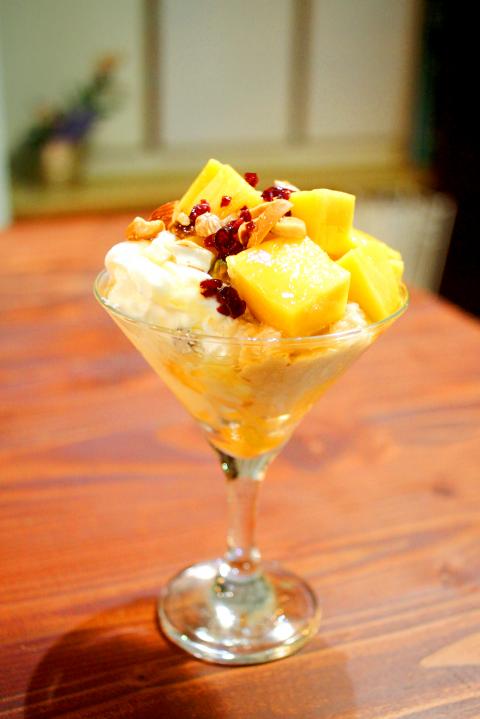
Photo: Davina Tham, Taipei Times
“It’s nothing so special or different to Japanese or Asian [food], just that the material is cow’s milk,” he tells me, pointing out that fermentation is already a cornerstone of Asian cuisines. It’s what gives us versatile pantry staples (like miso and fish sauce) as well as foods with an inimitable stench (like kimchi and stinky tofu).
As a source of probiotics, which have been credited (inconclusively) with health benefits ranging from better digestion to stronger immunity, yogurt also aligns with the practice of “food as medicine” (藥食同源) that’s central to traditional Chinese medicine, Osamu adds.
Refreshed by these unorthodox views, I get my hands on five local all-natural brands to find out how Taiwan is making yogurt its own.
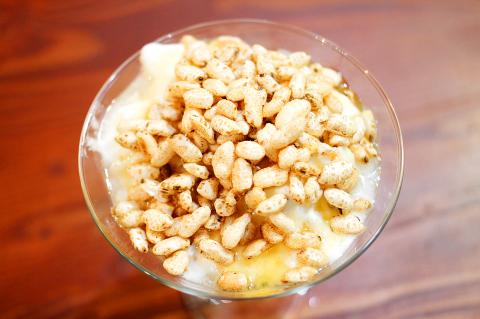
Photo: Davina Tham, Taipei Times
AKUEN YOGURT
Akuen Yogurt (阿娟優格) is easily the most charming shop I visit for this review. Sitting down after making my order, I feel like a child waiting for an after-school snack amid wooden furniture, coloring sheets and a country rock soundtrack.
Milk for the yogurt is sourced from Four Ways Ranch (四方牧場) in Miaoli’s Jhunan Township (竹南). My Greek yogurt parfait (NT$125) comes with a tumble of perfectly ripe mangoes, warm oats, roasted almonds and dried cranberries. This is all topped with such a generous serving of Tainan honey that the stem of the parfait glass arrives sticky.
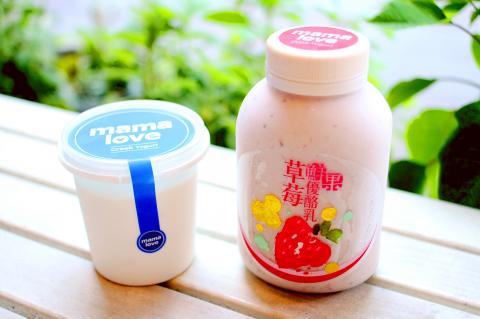
Photo: Davina Tham, Taipei Times
Seasonal fruit pairings for the parfait also include dragonfruit, watermelon, guava, blueberry, apple, lemon and even cucumber (although the shop attendant admits no one has ordered that yet).
The yogurt with puffed rice and honey (NT$50) will be a source of nostalgia for locals, with little kernels that are malty, fragrant and an unexpectedly good accompaniment to natural (that is, unstrained) yogurt. Gym-goers might also be interested in a bottle of protein-rich whey liquid (NT$70).
Take-home jars of natural yogurt (NT$330) and Greek yogurt (NT$220) are available at the shop, alongside drinking yogurts in flavors like red Job’s tears (NT$110) and banana (NT$115). Customers are encouraged to do their bit for the environment by returning used glass jars.
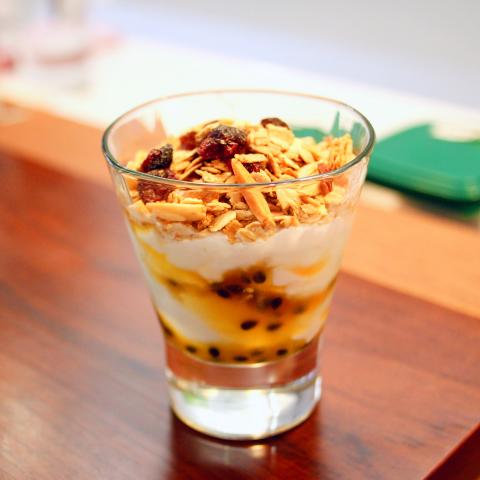
Photo: Davina Tham, Taipei Times
■ 44, Lane 251, Nanjing E Rd Sec 5, Taipei City (台北市南京東路五段251巷44號); open Mondays to Fridays, 1:30pm to 9pm and Saturdays, 10am to 3pm; available at select supermarkets and online (akuenyogurt.com)
MADAM JAN’S
Madam Jan’s natural yogurt (NT$330) has been a staple in my own fridge for a while, as the creamiest and mildest variety that I’ve tasted in supermarkets here. I’ve deployed it in sweet and savory situations, from fruit smoothies to cucumber raita.
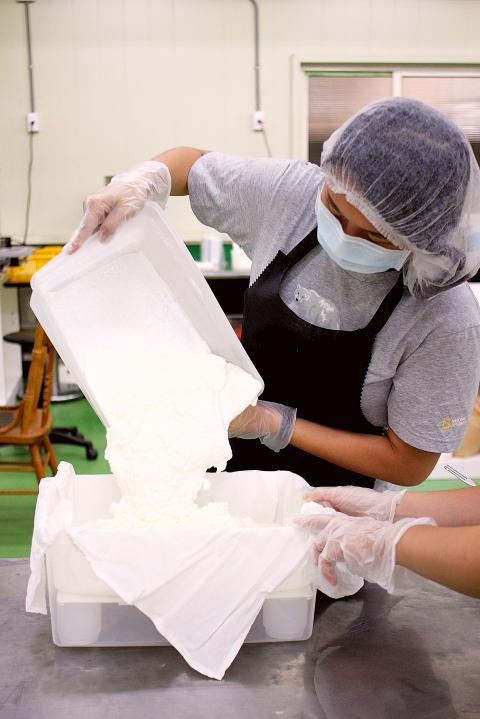
Photo: Davina Tham, Taipei Times
So I was surprised to learn that Madam Jan’s is made with Guang Quan (光泉) milk. It’s a mass-market brand, but one that Osamu settled on only after testing more than 20 types of milk, in pursuit of the fragrance and texture of European yogurt.
Although the company does not have a dine-in shop, a visit to the humble yogurt-making outfit in New Taipei City gave me a chance to try some other flavors. Madam Jan’s has probably the widest range of any local brand, including natural and Greek yogurts in different fat percentages, a slew of Greek yogurt cups with toppings and even a line of savory yogurt dips.
Of the Greek yogurt cups, the most unique flavor combines brown sugar, walnuts and chia seeds (NT$120). Local brown sugar is darker — it’s called “black sugar” (黑糖) in Chinese — and also more complex in flavor than other types. The resultant thick, tangy syrup is great for a change from the more common berry jam toppings, which the company also makes in-house.
A savory Greek yogurt dip with dill and lemon zest (NT$210) is appetizing, but lacks the brightness of a freshly-made yogurt sauce. Cucumber and olive tapenade round out a trio of dips.
What’s much more difficult to replicate at home is the lightly sweetened soy yogurt (NT$95), Osamu’s response to the high occurrence of lactose intolerance among people of East Asian descent.
Sour soy products are touch-and-go, and I’m told that in the early days of this yogurt, it was repeatedly returned by customers who thought it had gone bad. But after adding vanilla, Madam Jan’s has arrived at a delectable version that even a skeptic like me licked clean.
■ Available at Breeze, City Super, Jason’s, Shin Kong Mitsukoshi, Sogo and Wellcome supermarkets
MAMALOVE
Aside from yogurt cups in summertime mint and year-round honey flavors (NT$75), Mamalove excels at yogurt drinks. The pale pink shade of strawberry drinking yogurt (NT$250), made with pesticide-free strawberries from Dahu (大湖) township in Miaoli County, belies its full-throated fruitiness. Other flavors include guava, passionfruit and mulberries.
A cup of Greek yogurt (NT$115) was enjoyably thick and milky, but there’s no reason to go all the way to Neihu District (內湖) for it unless you’re in the neighborhood, especially since Mamalove also delivers.
■ 135, Gangqian Rd, Taipei City (台北市港墘路135號); open Mondays to Fridays, 10am to 7pm; available at select supermarkets and online: mamalove.tw.
MATTHEW’S CHOICE
Emphasizing food integrity, Matthew’s Choice (馬修嚴選) works closely with dairy farmers in Chiayi for its milk, and sources fruit for its jams directly from farmers around the country. The natural yogurt (NT$330) is light, and almost a little too watery for me. But for those aiming to reap yogurt’s health benefits, the company has started selling a “G+” version with upgraded microbial cultures (NT$350).
Offerings at the sleekly-designed yogurt bars are straightfoward — the usual fruit and granola yogurt parfait (NT$120) or a more elaborate set that includes seasonal jams and a granola cookie (NT$199).
My yogurt parfait comes topped with passionfruit jam and some excellent nutty, crunchy granola. Oats, almonds and cashews are all roasted separately before being mixed together with dried cranberries, which don’t stick to my teeth. There are also seasonal granola flavors — milk and mulberry (NT$330) this summer — although I do prefer the original.
■ Various locations listed at matthewschoice.com; available at select supermarkets
SNOW FACTORY
Snow Factory (雪坊優格) may sell family-size tubs of plain natural yogurt (NT$330), but it’s the ice cream from this frozen yogurt bar that most people end up taking home. Flavors range from chocolate through the range of berries to rose apple.
Failing to narrow my choices down, I get a double scoop (NT$219). Frozen plain yogurt with raspberries is smooth and creamy but a little too sweet for me, even bordering on the artificial-tasting. Guava though, tastes just like a sun-dried version of the fruit.
I’m a big fan of durian, but still find it unfortunate that Snow Factory couldn’t resist jumping on this bandwagon. The pungent, custardy fruit usually lends itself very well to ice creams. But frozen yogurt is sour, and this combination ends up tasting a bit like durian gone bad.
Fermented durian is indeed a delicacy in some Malay and Indonesian cuisines, so this flavor might pique some tastebuds, but be warned that you’ll have to dive into the deep end — it’s only available by the pint (NT$330).
■ Various locations listed at snowfactory.com.tw; available at select supermarkets

It’s a good thing that 2025 is over. Yes, I fully expect we will look back on the year with nostalgia, once we have experienced this year and 2027. Traditionally at New Years much discourse is devoted to discussing what happened the previous year. Let’s have a look at what didn’t happen. Many bad things did not happen. The People’s Republic of China (PRC) did not attack Taiwan. We didn’t have a massive, destructive earthquake or drought. We didn’t have a major human pandemic. No widespread unemployment or other destructive social events. Nothing serious was done about Taiwan’s swelling birth rate catastrophe.

Words of the Year are not just interesting, they are telling. They are language and attitude barometers that measure what a country sees as important. The trending vocabulary around AI last year reveals a stark divergence in what each society notices and responds to the technological shift. For the Anglosphere it’s fatigue. For China it’s ambition. For Taiwan, it’s pragmatic vigilance. In Taiwan’s annual “representative character” vote, “recall” (罷) took the top spot with over 15,000 votes, followed closely by “scam” (詐). While “recall” speaks to the island’s partisan deadlock — a year defined by legislative recall campaigns and a public exhausted

In the 2010s, the Communist Party of China (CCP) began cracking down on Christian churches. Media reports said at the time that various versions of Protestant Christianity were likely the fastest growing religions in the People’s Republic of China (PRC). The crackdown was part of a campaign that in turn was part of a larger movement to bring religion under party control. For the Protestant churches, “the government’s aim has been to force all churches into the state-controlled organization,” according to a 2023 article in Christianity Today. That piece was centered on Wang Yi (王怡), the fiery, charismatic pastor of the

Hsu Pu-liao (許不了) never lived to see the premiere of his most successful film, The Clown and the Swan (小丑與天鵝, 1985). The movie, which starred Hsu, the “Taiwanese Charlie Chaplin,” outgrossed Jackie Chan’s Heart of Dragon (龍的心), earning NT$9.2 million at the local box office. Forty years after its premiere, the film has become the Taiwan Film and Audiovisual Institute’s (TFAI) 100th restoration. “It is the only one of Hsu’s films whose original negative survived,” says director Kevin Chu (朱延平), one of Taiwan’s most commercially successful